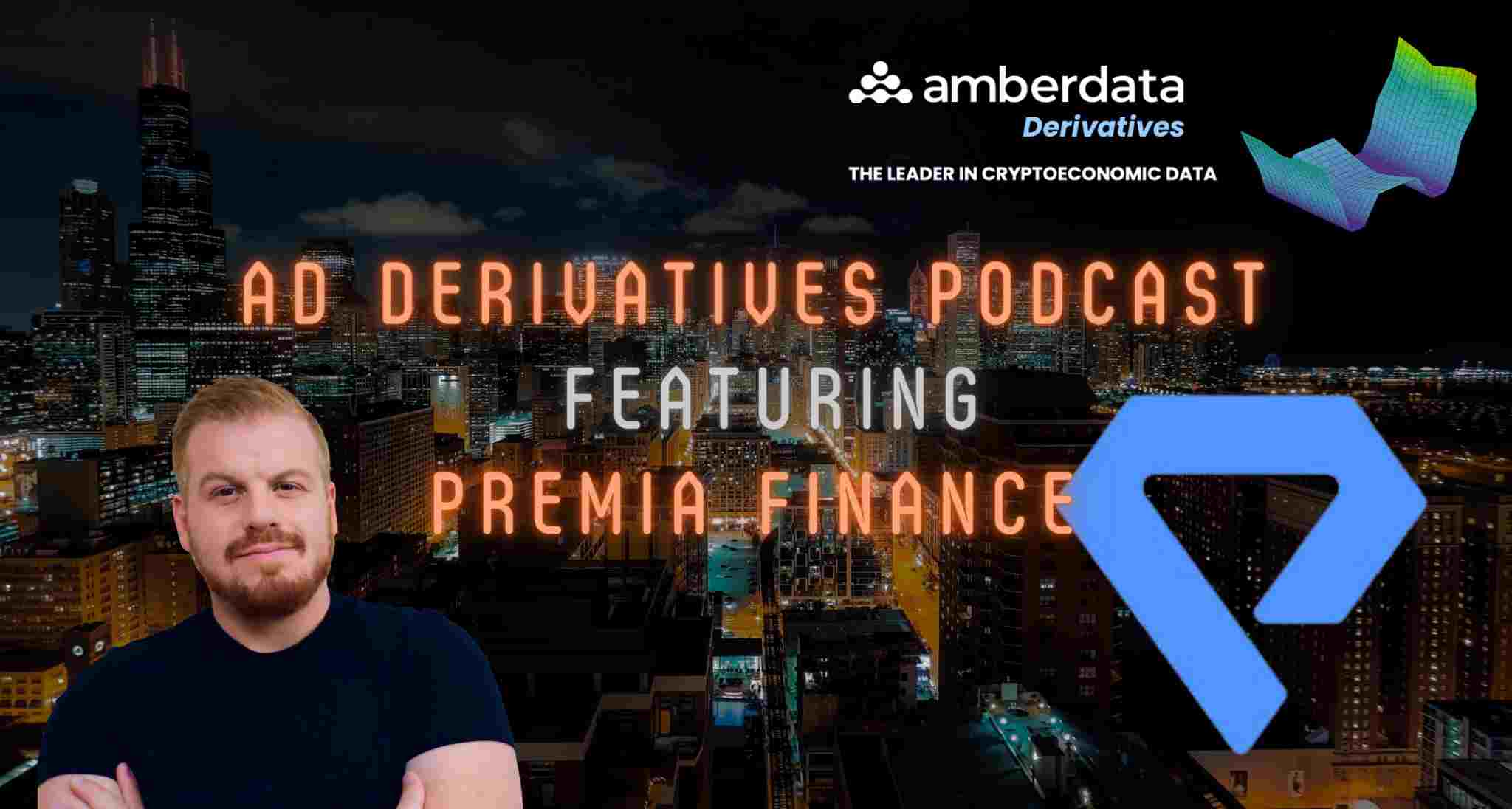AD Derivatives Podcast Featuring Premia Finance

Welcome to the AD Derivatives podcast led by Director of Derivatives; Greg Magadini. Featuring: DK the Co-Founder and Tolga the Quant of Premia!
In this episode of the Amberdata Derivatives Podcast, the hosts interview two members of the Premia team: DK, one of the co-founders of Premia, and Tolga, a leading quant and developer. The conversation dives into their backgrounds in traditional finance, the journey of Premia in the crypto space, and the evolution of their protocol over time. Their platform provides a broad tradable offering including orderbook, RFQ, AMM/Pool and vaults. Users also have the rare flexibility to "spin-up" new option pools. We also explored DK and Tolga's backgrounds before jumping into crypto and building Premia.
Background and Transition to Crypto
Drew, with 15 years of experience in traditional finance on the buy side, shares his journey into the crypto space. He began as an execution trader, transitioned to options market making, delved into systematic macro, and eventually decided to make a significant move into the crypto industry around 2020.
Toga, on the other hand, highlights his background, starting in a broker-dealer firm, working in various roles, and eventually overseeing big data analytics related to securities lending and listed derivatives. Their combined experience laid the foundation for Premia's journey into decentralized finance (DeFi).
Genesis of Premia
The Premia project was conceived during the airdrop era of 2020. Initially, the team discussed creating futures products for Sushiswap yields, which evolved into the idea of creating an altcoin market. By August-September 2020, they had an MVP (Minimum Viable Product) for a peer-to-peer options platform.
However, they quickly realized the challenge of pricing options in the crypto market, exacerbated by high gas fees on the Ethereum mainnet. To address these issues, they pivoted to a peer-to-pool model in November 2021, coinciding with the release of Arbitrum. Since then, they've been working diligently on their most recent version, V3, incorporating lessons learned from previous iterations and new technologies.
Transition from V2 to V3
Premia V2 focused on bringing on-chain IV (Implied Volatility) and utilized Deribit as a source of mature market data. They also introduced elements like supply and demand dynamics to affect option premiums based on utilization. V3 builds upon this foundation but with significant enhancements.
One of the key improvements in Premia V3 is the move towards a more orderbook-like experience within the AMM (Automated Market Maker). This allows users to engage in more versatile trading strategies, including shorting options, creating concentrated range orders, and trading in a more fluid manner.
Permissionless Pooling and Oracles
V3 introduces permissionless pooling, allowing anyone to create a market for an asset, provided there is an oracle for the asset's price. Currently, they've whitelisted Chainlink oracles, making it easy to create markets for assets covered by Chainlink feeds. They've also partnered with Redstone to expand the range of oracles available.
While not all pools will receive support for their implied volatility surfaces, they maintain stringent criteria to ensure the quality and liquidity of these markets.
SDK and Adoption
Premia has developed an SDK and API to make it easier for traders to interact with their platform, regardless of their preferred programming language. This approach simplifies integration for non-DeFi-native users and lowers the barrier to entry.
The containerized wrapper around the SDK abstracts away much of the complexity associated with Web3 integration, making it accessible to a wider audience, including traditional traders.
Regulatory Considerations
The Premia team acknowledges the lack of regulatory clarity in the crypto space. They've taken a proactive approach by registering in the British Virgin Islands (BVI) and pursuing licenses where necessary, even if not required immediately. They're closely monitoring developments in the regulatory landscape and ensuring compliance to the best of their ability.
Traditional Institutions and DeFi
The conversation explores the entry of traditional financial institutions into the DeFi space. The speakers discuss the emergence of a "Walled Garden" approach, where institutional DeFi operates separately from the broader ecosystem. They cite JPMorgan's "Onyx" platform as an example of this trend, expressing concerns about big banks forking DeFi protocols and imposing identity requirements.
Future Predictions and Solutions
The conversation concludes with predictions for the DeFi space. They anticipate that regulatory clarity will emerge within the next three to six years, necessitating a sandbox environment to accommodate the evolving market. They express optimism about DeFi's future and its potential to coexist with regulation. They also mention the role of technologies like CK Technologies in shaping the regulatory landscape.
Conclusion
Premia's journey from traditional finance to DeFi, coupled with their continuous development and adaptation, illustrates their commitment to providing versatile and user-friendly options trading solutions. They navigate the challenges of regulation with caution while expanding access to decentralized derivatives for traders worldwide.
Greg Magadini
Greg Magadini is the Director of Derivatives at Amberdata. Previously, he co-founded Genesis Volatility (later acquired by Amberdata). Greg Magadini started his career as a proprietary trader for DRW and Chopper Trading in Chicago IL. Greg has nearly 15-years of options trading experience and has been active in the...
